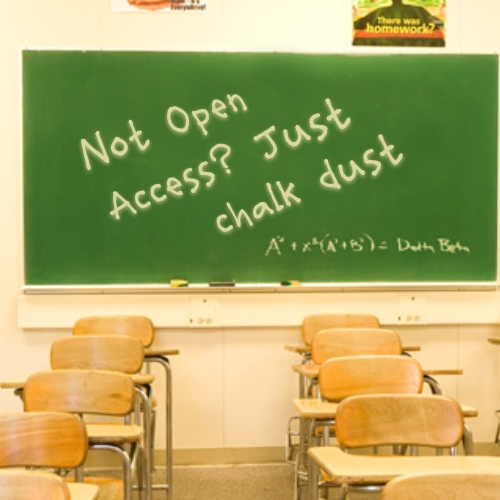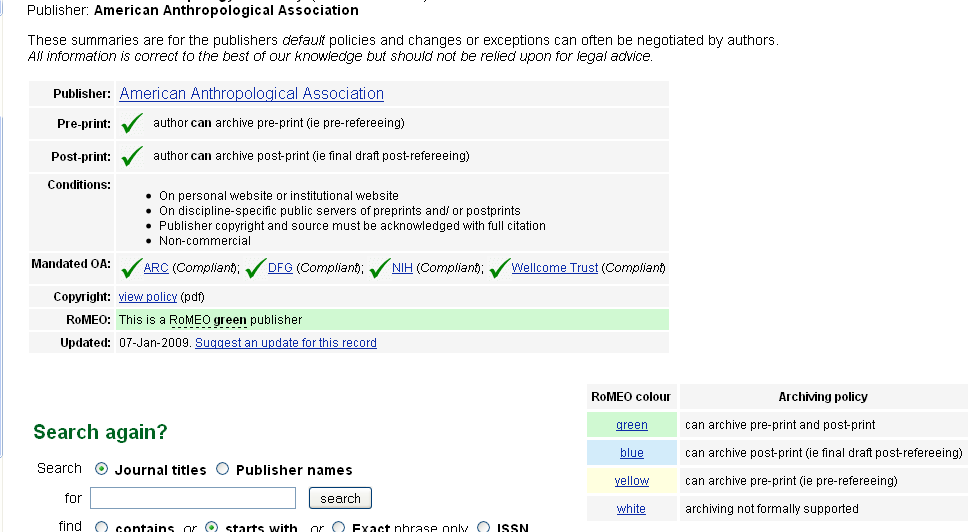

Yesterday we attended a seminar organized by the Centre for Educational Technology titled “Open Access in a Closed Institution”. The presenter Hussein Suleman is a senior lecturer with the department of Computer Science here at UCT and is an ambassador and expert on the open access movement.
The Open Access (OA) movement is nothing new; in fact it has been around for the past 50 years or so. In the middle of the 20th century people were bouncing the idea around of open access to knowledge, yet they clearly faced major challenges as the ability to share documents was not easily available. The internet explosion in the 1990’s meant that open access could truly be realized with the ability to share and distribute documents. Naturally the movement has its champions and its challengers.
Hussein spoke very briefly about the OA movement and some of the rather interesting developments in this area. Large institutions around the world are pushing for open access and taking measures to ensure that their own research outputs are made available. MIT (always a leader) has created arepository using the opensource dSpace software platform. This also includes over 20,000 thesis going back as far as the 1800’s!!!
It makes good academic sense to do this. For lecturers it creates an opportunity to collaborate and share research. For students it provides access to high quality research and makes it easy for the growing “just google it” generation to do what they do best.
Have you ever been searching for an older news clipping, found it on the newspapers website, and then been asked to pay for the article? I have found this incredibly irritating. Why should I have to pay for old news? This is an random rant – but the discussion really led me to think about it.
Traditionally, a researcher compiled a paper then searched for a publisher, got paid/credited, and published the article. In the process the original author may have lost some rights to their document and their ability to use it further or republish. The open access movement is pushing against this tradition and publishers are starting to listen. Hussein showed us a neat little tool that lets researchers check whether a journal allows you to republish an article which has been in their publication. Check the Romeo website and the screenshot below. Many journals do allow the author the ability to archive the article and in some cases even republish!
Here at UCT the idea of an open access repository for research has been under discussion for some time. Certainly our research output is scattered throughout the internet and in journals around the world, but can we account for it and provide details about it? Can we tell how many times those articles have been cited, or read? An open access digital archive could answer some of these questions.
Hussein has developed the UCT CS Research Document Archive for the Department of Computer Science here at UCT simply because he could not wait any longer for a university wide initiative to happen. They now archive their publications and are able to provide details of how and when articles were accessed. The Law Faculty has also felt the need for a digital archive for their own research and have launched UCT Lawspace which also powers dSpace. So it is clear that a unified system would be of great benefit if not only for these two faculties.
How does this relate to our OER Project?
Naturally the concepts of open access and open educational resources (OER) are directly related. OER may be considered a child or product of the open access movement. When I hear Hussein talk about his struggles with getting support for his project I get slightly nervous.
When I think of OER resources in the context of UCT I think of research output almost immediately. Research papers, handbooks, conference papers, and articles will make a tremendous addition to our project. Having them searchable and accessible will be of tremendous benefit in terms of reputation.
I thought about licensing and how the articles currently offered in our two digital archives are made available. We should follow up with Hussein about how they deal with this and maybe introduce the creative commons license to him. Also in terms of our OER repository, will we make available content with difference licenses? Can we make available content under more restrictive licenses?
I keep thinking about libraries throughout this process and in doing the research for our OER project. Libraries by definition are “a collection of information, sources, resources, and services, and the structure in which it is housed” . I really think that the library has some stake in the way we offer up OER resources as well as research output. I did a quick test to see if I could find an article which had been published and archived in Hussein’s repository could be found in our library. I attempted two cases and could not find the articles listed on the library website.
I am not criticizing our library by any means. We would just like to see things harmonized in a more efficient manner. The information age crept up on us really fast and we are typically learning by google’s example on how to deal with it all. I really want to read What would Google do?

